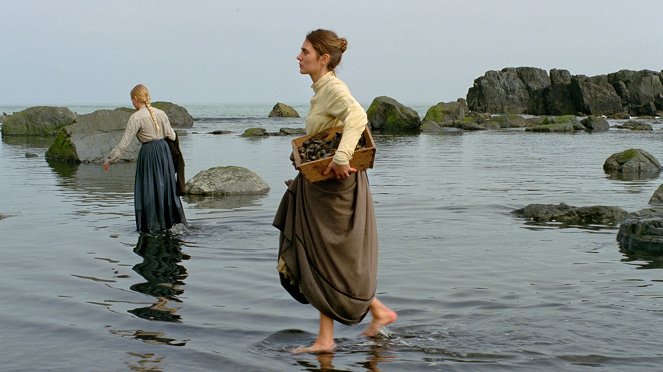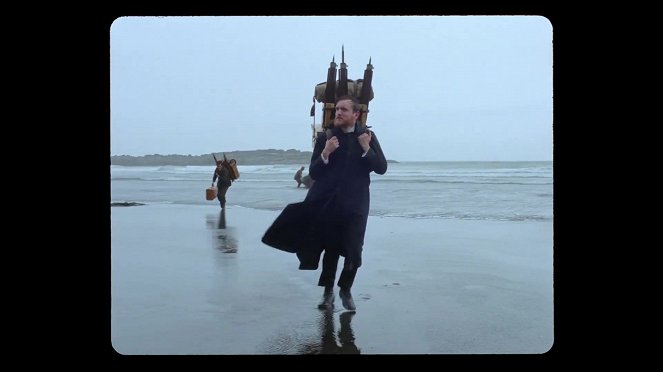Ohjaus:
Hlynur PálmasonKäsikirjoitus:
Hlynur PálmasonKuvaus:
Maria von HausswolffSävellys:
Alex Zhang HungtaiNäyttelijät:
Elliott Crosset Hove, Ingvar Sigurðsson, Victoria Carmen Sonne, Jacob Lohmann, Hilmar Guðjónsson, Waage Sandø, Ída Mekkín Hlynsdóttir (lisää)Suoratoistopalvelut (2)
Juonikuvaukset(1)
Nuori ja tinkimätön tanskalainen pappi Lucas lähtee 1800-luvun lopulla komennukselle Islantiin, Tanskan silloiseen siirtomaahan, jossa hänen tehtävänään on rakennuttaa kirkko sekä dokumentoida uuden luterilaisen seurakunnan syntyä ja sen asukkaita. Armoton luonto, matkanteon vastoinkäymiset sekä islantilaisten epäluulo tanskalaisia kohtaan alkavat kuitenkin hitaasti kalvaa Lucasin vankkumatonta uskoa ja omatuntoa ajaen hänet aina vain kauemmas alkuperäisestä tarkoituksestaan. (Cinemanse)
(lisää)Videot (3)
Arvostelut (5)
Godland is an aptly depicted journey through the Icelandic wilderness without Gore-Tex. Meditative and very slow, but atmospherically engaging and with a supporting plot premise, it is a bit reminiscent of Scorsese’s Silence. The very idea of basing a story on real historical photographs taken by a vanished priest is interesting. And with his careful composition in the “photographic” 4:3 format, Pálmason gives it remarkable content. Thought it’s only philosophically suggestive, it is interesting and valuable. Edit: The filmmakers revealed in discussions that the photographs weren't real. Hmm. I just didn't expect such a creative approach with this film... [KVIFF]
()
Wandering through the Icelandic landscape has to be engaging, and the overlong runtime wasn't a problem for me. I had problems with characterisation of the characters, though, because the main (anti)hero is an uninteresting miserable wretch, and after a subdued two hours of wandering through the wilderness, his further actions and the subsequent backlash of the other characters in the last sixth of the film seemed to fall out of the blue, and I didn't feel that they were heading in that direction in any way, even covertly. Nicely shot, inconsistent in content. [KVIFF 2022]
()
Boreland. Unless you analyze it artistically, you won't find the film of the year here, unlike some others. This disgustingly overwrought journey through 19th century Iceland almost put me to sleep, even though it was the very first screening of this year's KVIFF. The development of the characters was vague, the denouement of the conflicting lines felt out of place, I didn't get the reason of the outcome (that escalated quickly). The cinematography is of course beautiful, but you'd have to be a complete moron to fuck up shots of the Icelandic landscape. Objectively, it's not really a two-star film, but I've been running out of patience with unreasonably long runtimes lately, and here the 138 minutes really weren't used effectively. So you’re getting two stars, Hlynur, and search your conscience. (56th KVIFF)
()
The third feature film by Icelandic director Hlynur Pálmason is in many ways reminiscent of Werner Herzog's early work. At the end of the 19th century, Lucas, a Danish priest, sets out to build a church in a remote part of Iceland and encounters not only the untamed landscape, but also the flamboyant guide Ragnar and the specific mood of the local folk. Godland is shot in 4:3 format, which corresponds to the historical background itself – in the introduction we are told that the film is based on seven photographs from that time. It’s precisely the photographic nature of the image that is the strength of the film, which excels in the ingenious creation of contrasts. Lucas leaves the comforts of home and finds himself in an inhospitable land where he’s confronted by the harsh Ragnar, who in contrast is in harmony with his surroundings. However, Pálmason also emphasises the thematic differences with individual shots that also sound contrasting – a group of wandering people lose themselves in the foreground of majestic hills; a long shot of the tired protagonist lying down is followed by the eruption of a volcano. The film takes us to a fascinating land, at once beautiful and haunting, where nature reigns supreme and where priests have no place. Unfortunately, it’s 140 minutes long, often mired in compositions that have only a symbolic function, and completely detached on an emotional level. The development of the relationship between Lucas and Ragnar is inadequately portrayed, and compared to the aforementioned Herzog, the film also limps as a parable about the decline of the human individual. Nevertheless, it is a visually and spiritually stimulating piece that stands out in a quiet hall with a huge screen.
()
Kuvagalleria (29)
Kuva © Films4you



Mainos